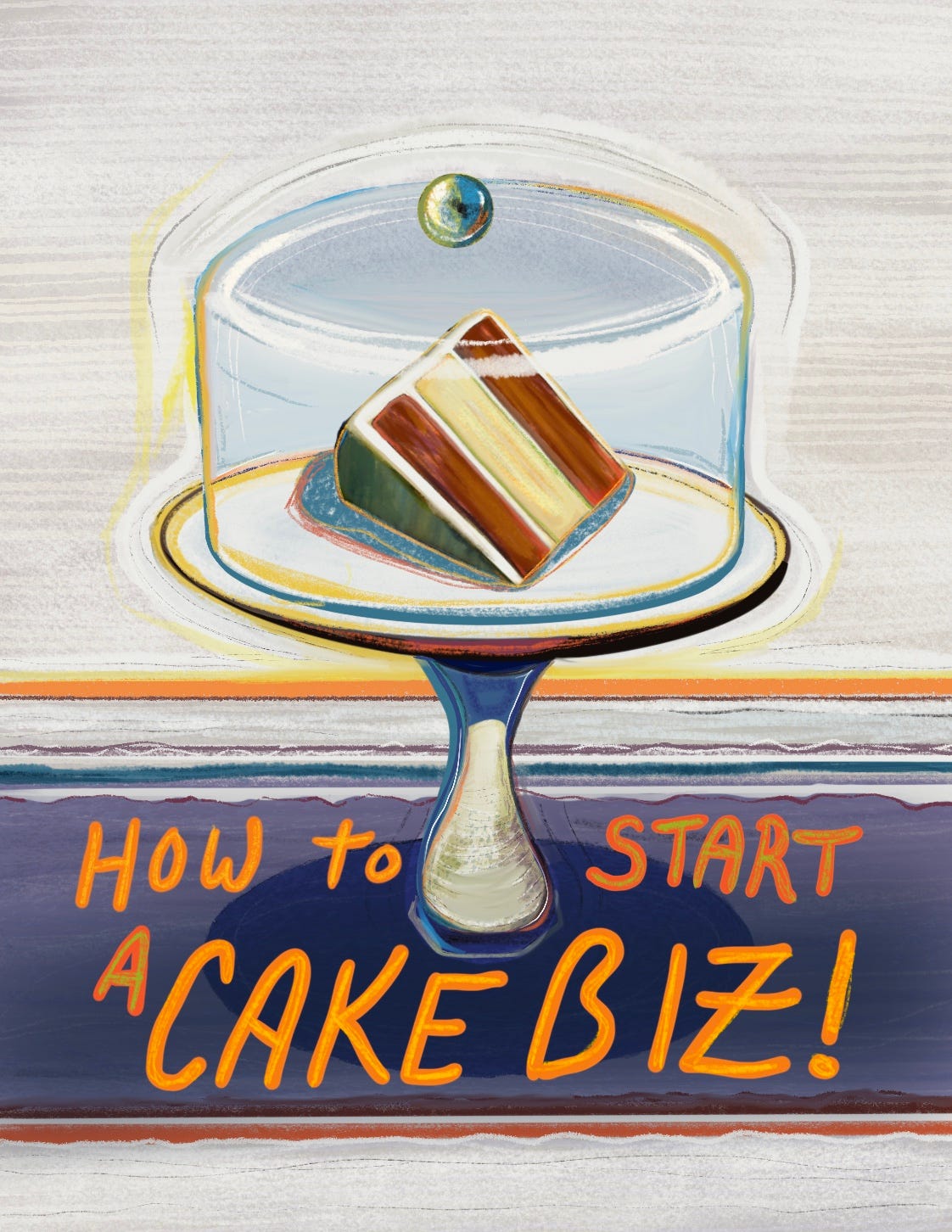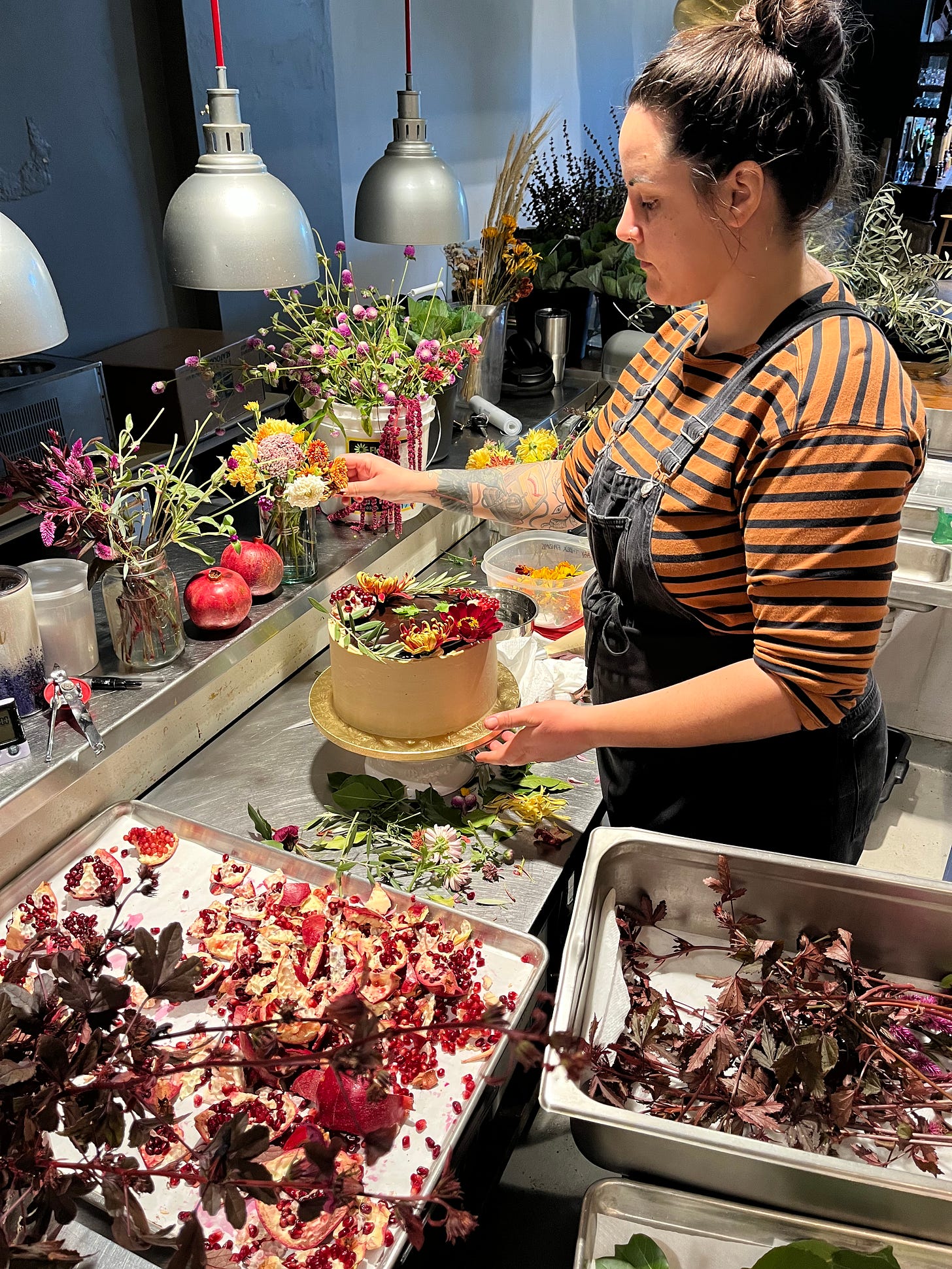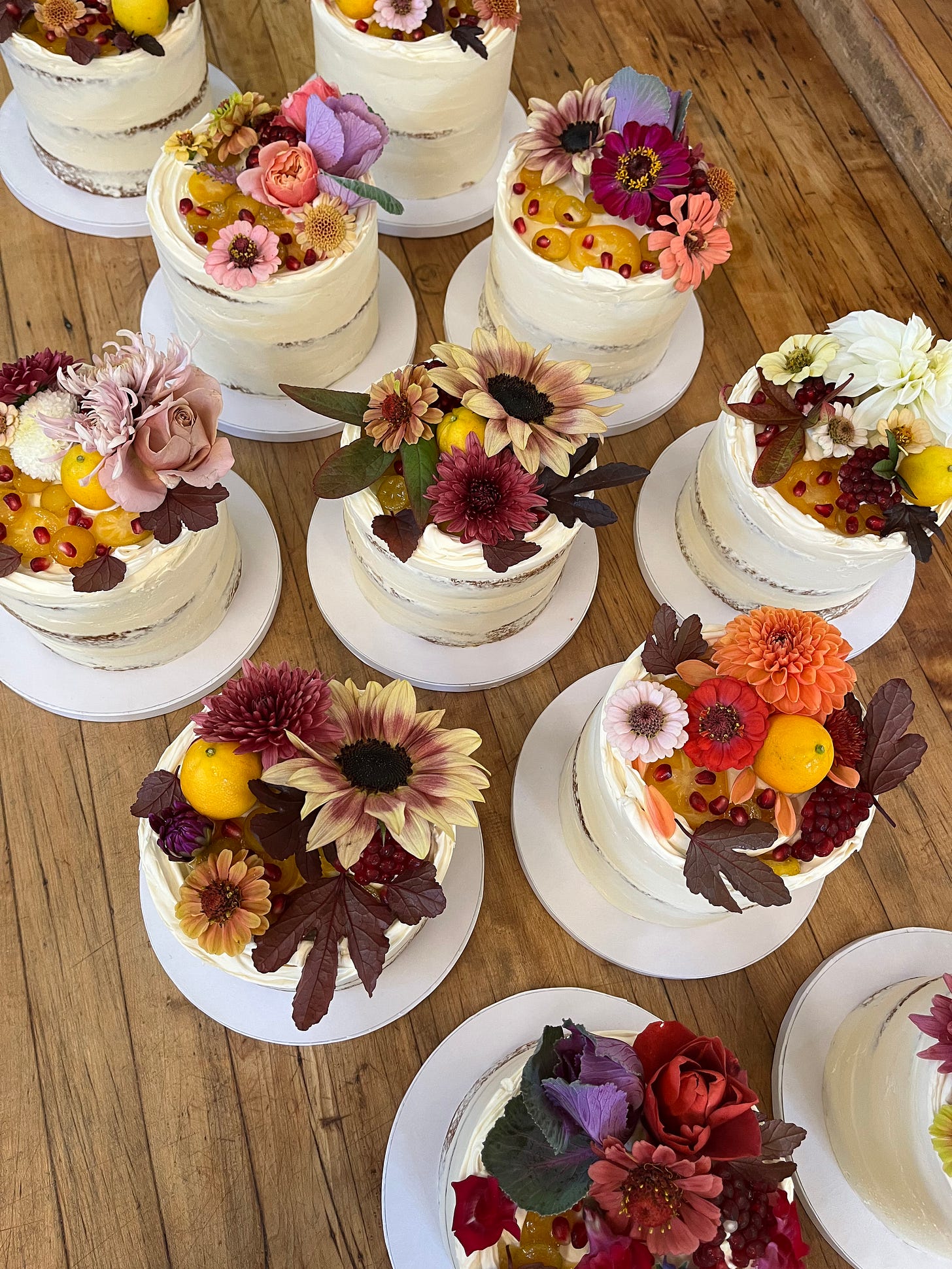How to start a cake business
Including an impossible-to-replicate model, with notes from someone who's been there.
I’ve tried to write this essay multiple times and it has never felt right. Looking back over my initial draft, I found myself deleting large portions and cringing at jokes I made two years ago that ring hollow now. When I started this newsletter, I had hoped to monetize it by providing advice to people who want to start baking for money from home. My initial plan was to use free newsletters to provide recipes and news about my business, and place cottage baking tips behind a paywall. This no longer feels workable. The truth is I think most people who come to me for advice about how to start a home baking business are actually looking for the courage to begin. I don’t think I can give you that - I didn’t have it, myself. I started my own business unintentionally, by degrees.
If you wanted to follow the path I took when I started Bayou Saint Cake, here’s what you would do:
Get laid off from your pastry chef job in the middle of an unprecedented global pandemic. You have about twenty years of professional kitchen experience.
Immediately qualify for enhanced unemployment from the government. Ironically, at this stage you’ll be making a bit more than your former salary - perfect for covering your expenses while you get your business off the ground.
Speaking of expenses - you share a home with both your wife and your father-in-law, so you’re able to keep housing expenses low. You qualify for health insurance through your wife’s job, so that’s covered. You’re also child-free by choice and don’t have student loans.
You’ve got a moderate social media following from having been in the business for so long, so once you announce that you’re now baking cakes “until things become normal again”, the orders begin to flow in.
You have access to a (free!) commissary kitchen from your (incredible) former employer, so you don’t need to worry about finding space or equipment to bake from home. Eventually, you nab a residency at a culinary museum with a full professional kitchen, where you’re able to continue working - no rent required.
By the time you get kicked off unemployment, you’re busy enough through word-of-mouth recommendations that you’re able to cover your expenses. Your years of experience in restaurants means you already have a working knowledge of food costs and you’re decent at keeping a budget. You hire someone to help you pay your taxes and you finally get an LLC.
You have an eye for photography and it’s easy for you to take nice pictures of your work. You’ve never felt like posting on social media was onerous, so your growth there expands organically over the years.
Eventually, you get noticed by magazine editors who want to feature you. It helps that you’re queer and based in the south - these are generally underrepresented in national media. These features allow you to continue to bring in new clients. You’ve never had to pay for an ad.
Even with all of the advantages I had, I still had to work incredibly hard to make the math work. The profit margin in food is wildly slim, and growing thinner all the time. I had many reasons for wanting to wind down my business, but a huge part of that was simply not wanting to engage in 60+ hours a week of grinding physical labor in order to make ends meet. I love being my own boss, I love decorating cakes, but it simply was no longer worth it to me. The idea of actively encouraging people to take that path - and taking their money while I’m at it - feels like a grift.
Sometimes I wonder if the only way I had the hubris to re-imagine my life as a freelance writer is because I came from an even more doomed profession, but that’s a story for another day.
There are people who have successfully monetized the cake consultation gig - Don’t Tell Charles is one. They offer a full suite of recipes, time management systems, and decorating videos. Their products seem valuable! I’m not knocking the entire business model, but I’ve learned that I’d rather teach one-off baking classes geared towards specific recipes or techniques that anyone can use, rather than trying to sell a system for a lifestyle that I don’t even want for myself.
That being said, here are the main points I’d ask you to consider if you told me you want to be an independent baker:
Do you know how much money you need to make in a month to cover your expenses? This should be a very specific number, and include both the obvious stuff (rent, food, phone bill) and more long term expenses (travel, car repairs, clothing). It took me a really long time to figure this out for myself - my twenties were pretty disastrous and I had the classic line-cook Peter Pan syndrome where money didn’t feel real and my life lacked a lot of structure and personal accountability. ANYWAY - figure out your budget. Working for yourself as an independent baker is like being the most chaotic freelancer of all time, and you will be fundamentally stressed if you’re always worried about how you’ll cover the bills. I use an app called You Need A Budget to sort out my life - it isn’t free but keeps me sane (not sponsored, I think they may be religious wingnuts IDK). If you really want to be prepared, I’d consider saving two months worth of expenses before you begin.
Speaking of that, you should figure out if you like being a full time independent baker before investing serious cash in your business. A lot of folks think they need the full package before they start: chic website, professionally designed logo, fancy stickers, the works. I wouldn’t even pay the fee for an LLC before trying it out part-time for at least a month or two. You’ve seen it before: the line cook you used to work with makes a splashy announcement about their new pop-up, including a photo of their LLC application, only to never be seen or heard from again - because trying to run a pop-up full-time low key kind of sucks and they didn’t bother to learn that first. (For what it’s worth, savory pop-ups are a whole different ball game than cottage baking - both are hard, but the former is MUCH harder, both for legal reasons relating to food safety, as well as the huge logistical lift of running a temporary restaurant in an unfamiliar place).
Baking one cake is one thing, but understanding the systems you need in place to bake ten is another. If you’ve never worked in a bakery before, there will be a huge learning curve. I genuinely don’t think you can learn to do this from reading a newsletter. It’s about muscle memory, hustle, and organization- and these things come with practice.
I’ve already written a newsletter about food cost (that comes with an example food costing spreadsheet that you can download and noodle around with). Ingredients will be your largest expense, but you also need to factor in packaging, disposables (like gloves and piping bags), and decor (like flowers) into your pricing. After that comes commissary rent (if you have one), website hosting fees, insurance, and credit card processing fees. You should also consider the time that it takes you to source everything you need. I gave myself one full day a week just to go to Cosco, Restaurant Depot, the farmer’s market, the cake supply store, and the restaurant smallwares store. You need to be paid for that time in order for running a small food business to make sense, and the way you pay yourself is by charging enough for your labor through the prices of your cakes.
Are you emotionally resilient? It is inevitable that you will eventually get bad feedback on a cake. The first time it happened to me, the woman was particularly nasty about it. I read her email and felt the entire bottom drop out of my stomach. It felt like I was going to die. I then contacted every single person who had arranged a pick-up for that flavor of cake that weekend and sent them all a refund. This was not a normal reaction to bad feedback. The rest of my customers were really confused! The truth is, none of us can prepare a perfect product all of the time - to expect that of ourselves is doing an enormous disservice to our well-being. If getting negative feedback is hard for you, you should make an effort to develop some tools to make the process less scary and disorienting. Give Rejection Sensitive Dysphoria a google if this sounds familiar.
Are you familiar with food safety? If you have a lot of restaurant experience you probably understand the basics, but if you don’t, you should immediately familiarize yourself. Cottage food laws exist to allow people to bake legally out of their homes (rather than out of restaurants or commissaries, which get routinely inspected) because (generally!) baked goods + jams are less likely to make people ill than, say, smoked fish. These laws vary from state to state, with some states requiring you to take a class or get certified. Louisiana cottage food laws are hilariously vague - if your state has similarly incoherent language in their statute, I’d reach out to a baker you admire in your region and hear what steps they took to get legal and stay (food) safe. And given that even the best laid plans sometimes go awry, if you’re serious about pursuing a small food biz, look into insurance. I bought mine from the Food Liability Insurance Program, which offers coverage for folks like me, who worked out of a commissary, as well as home based bakers. Full disclosure: I’ve never had to make a claim, so I can’t speak to that part of the process.
You should prepare yourself for how much space you will need to do the job properly if you’re working completely from home. Independent bakeries are a numbers game. You will either need to be making a lot of product, or charging a lot of money for less product. It is unlikely that you will be able to charge New York prices for a cake right away, if ever, especially if you’re based in a smaller market. In the height of my own productivity, I was making up to twenty-eight cakes in a weekend, or forty king cakes in a day. I was able to do this because I had access to industrial mixers and a walk-in. In my most recent kitchen space, I was limited to a max of about sixteen cakes in a weekend due to refrigeration constraints. By that point, I was able to charge more for my cakes, and they featured considerably more elaborate decor, so I was able to make it work.
Is social media promotion a breeze for you? If you don’t want to pay for advertising on socials, you’ll need to achieve organic engagement with your posts. That means posting a LOT, ideally at least every other day. No one wants to hear this, and I get that it really sucks! But people need to be reminded that you exist in order to buy from you, and they need to be reminded a lot, because there’s no guarantee everyone who follows you will see every post. Here’s a brief overview of how I take and edit photos for social media. I only use an iPhone and Instagram’s built-in editing tools - you truly don’t need to invest money in a fancy camera, I promise. I also highly recommend Rachel Karten’s social media newsletter Link in Bio, especially this piece on writing captions for social. I write my subscription off on my taxes.
In summary - do you enjoy cooking? Like, a lot? So much so that when it’s your full time gig, your life won’t be totally sapped of color? Do you also enjoy cleaning every single day? Fond of customer service? Do you adore accounting? How do you feel about emails? These are all huge parts of the job, and if there’s one that you absolutely despise, you may want to ask yourself if this is the right path. That doesn’t mean you have to be good at all of these right away (I’m still only mid at accounting) but unless you have the disposable income to hire someone to do some aspects of the job for you, you’ll likely be doing all of them, all of the time.








Nodding vigorously to all of this and sending two thumbs up- expect my right thumb is crooked and swollen from the chronic carpel tunnel I've developed from holding an offset for 8 years straight 🙃
I really needed to hear this today. I was recently laid off from my marketing job and am debating whether to turn my hobby into a cake business. This is the realistic advice I need to help me decide. Thank you!